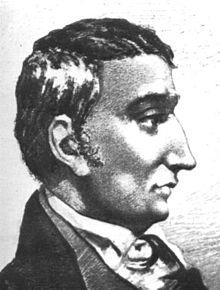Saint-Simonianism was a French political, religious and social movement of the first half of the 19th century, inspired by the ideas of Claude Henri de Rouvroy, comte de Saint-Simon (1760–1825).
Saint-Simon's ideas, expressed largely through a succession of journals such as l'Industrie (1816), La politique (1818) and L'Organisateur (1819–20)[1] focused on the perception that growth in industrialization and scientific discovery would have profound changes on society. He believed that society would restructure itself by abandoning traditional ideas of temporal and spiritual power, an evolution that would lead, inevitably, to a productive society based on and benefiting from, a " ... union of men engaged in useful work"; the basis of "true equality".[2]
Saint-Simon's writings
Saint-Simon's earliest publications, such as his Introduction aux travaux scientifiques du XIXe siècle (Introduction to scientific discoveries of the 19th century) (1803) and his Mémoire sur la science de l'homme (Notes on the study of man) (1813), (the latter of which is a eulogy to Napoleon), demonstrate his faith in science as a means to regenerate society. In his 1814 essay De la réorganisation de la société européenne (On the reorganisation of European society), written in collaboration with his then secretary Augustin Thierry, Saint-Simon seems to have foreseen the European Union, expecting however that England would take the lead in forming a continent sharing the same laws and institutions.[3]
For his last decade Saint-Simon concentrated on themes of political economy. Together with Auguste Comte, (then only a teenager), Saint-Simon projected a society bypassing the changes of the French Revolution, in which science and industry would take the moral and temporal power of medieval theocracy.[3]
In his last work however, Le Nouveau Christianisme (The New Christianity) (1825), Saint-Simon reverted to more traditional ideas of renewing society through Christian brotherly love. He died shortly after its publication.[1]
The arts
In his last years and in the period after his death, Saint-Simon's ideas, which gave prominence to art as a prized aspect of work, interested numerous artists and musicians, amongst them Hector Berlioz, Félicien David (who wrote a number of hymns for the movement) [4] and Franz Liszt. For a brief period, the historian and writer Léon Halévy acted as secretary to the philosopher.
The movement after Saint-Simon's death
Following Saint-Simon's death in 1825, his followers began to differ as to how to promulgate his ideas. A 'charismatic' faction, led by Barthélemy Prosper Enfantin, purchased the newspaper Le Globe as their official organ, and formed an increasingly religiously-minded ritualistic group based on a community founded at Ménilmontant, before being banned by the authorities in 1832. Following this some of Enfantin's followers visited Constantinople and then Egypt and influenced the creation of the Suez Canal in search of Messianic revelations, and the formal Saint-Simonian movement expired.[5]
However, others who had been associated with the group and were not followers of Enfantin, (such as Olinde Rodrigues and Gustave d'Eichthal) developed Saint-Simonian notions practically and involved themselves in the development of the French economy, founding a number of leading concerns including the Suez Canal Company and the bank Crédit Mobilier.[6]
It has also been noted that Saint-Simonian ideas exerted a significant influence on new religious movements such as Spiritualism and Occultism since the 1850s.[7]
People associated with the Saint-Simonian movement
- Amand Bazard (1791–1832), socialist
- Philippe Buchez (1796–1865), historian, sociologist, and politician
- Michel Chevalier (1806–1878), statesman, economist and free-market liberal
- Auguste Comte (1798–1857), first philosopher of science
- Félicien David (1810–1876), composer
- Claire Demar (1799–1833), author, feminist
- Jeanne Deroin (1805-1894), author, journalist, feminist, seamstress, social reformer
- Gustave d'Eichthal (1804–1886), writer and publicist
- Barthélemy Prosper Enfantin (1796–1864), social reformer
- Simon Ganneau (1805–1851), sculptor, socialist, feminist, mystic
- Désirée Gay (1810–1891), publisher, feminist, seamstress, social reformer
- Henri Germain (1824-1905), businessman and founder of Crédit Lyonnais
- Charles Joseph Bay, explorer and engineer
- Suzanne Voilquin (1801–1876), author, editor, midwife, feminist
- Rosa Bonheur (1822-1899), painter
References
- ^ a b Hewett, 2008
- ^ Saint-Simon, quoted in Leopold, 1998
- ^ a b Goyau (1912)
- ^ Locke, Ralph P.. "Music, Musicians, and the Saint-Simonians", Chicago: Univ of Chicago Press, 1986. ISBN 0226489027
- ^ * Karabell, Zachary (2003). Parting the desert: the creation of the Suez Canal. Alfred A. Knopf. pp. 31–37. ISBN 978-0-375-40883-0.
- ^ Leopold, 1998
- ^ Strube, 2016
Bibliography
- Butler, Eliza Marian. The Saint-Simonian Religion in Germany; A Study of the Young German Movement, New York: H. Fertig, 1968.
- Carlisle, Robert B. The Proffered Crown: Saint-Simonianism and the Doctrine of Hope, Baltimore: Johns Hopkins Univ. Press, 1987. ISBN 0801835127
- Durkheim, Emile.Socialism and Saint-Simon (Le Socialisme), Ed. and with Intro by Alvin W. Gouldner. Charlotte Sattler (Translator). Yellow Springs, OH: Antioch Press, 1958.
- Gerits, Anton. Additions and Corrections to Jean Walch Bibliographie du Saint-Simonisme, Amsterdam: A. Gerits, 1986. ISBN 9070775026
- Goyau, G. Saint-Simon and Saint-Simonism in the Catholic Encyclopedia, New York, 1912.
- Hewett, Caspar, Henri de Saint-Simon, the Great Synthesizer, 2008.
- Leopold, David, Saint-Simon, Claude-Henri de Rouvroy in E. Craig (ed.). Routledge Encyclopaedia of Philosophy, London, 1998.
- Osama W. Abi-Mershed. Apostles of Modernity: Saint-Simonians and the Civilizing Mission in Algeria. Palo Alto: Stanford UP, 2010.
- Pankhurst, Richard K. P. The Saint Simonians, Mill and Carlyle: A Preface to Modern Though, Norwood, PA: Norwood Editions, 1976. ISBN 0848220927
- St-Simon, "Letters from an Inhabitant of Geneva to His Contemporaries" at the Marxist Internet Archive.
- Shine, Hill.Carlyle and the Saint-Simonians: The Concept of Historical Periodiciy, New York: Octagon Books, 1971.
- Strube, Julian. Socialist Religion and the Emergence of Occultism: A Genealogical Approach to Socialism and Secularization in 19th-Century France. Religion, 2016.
